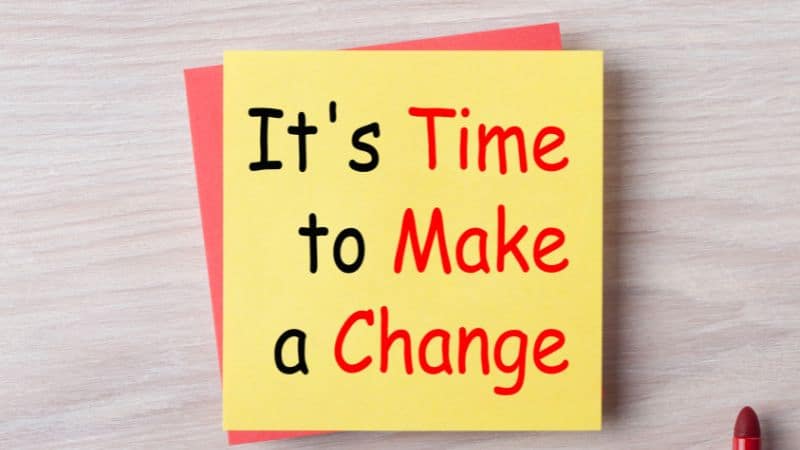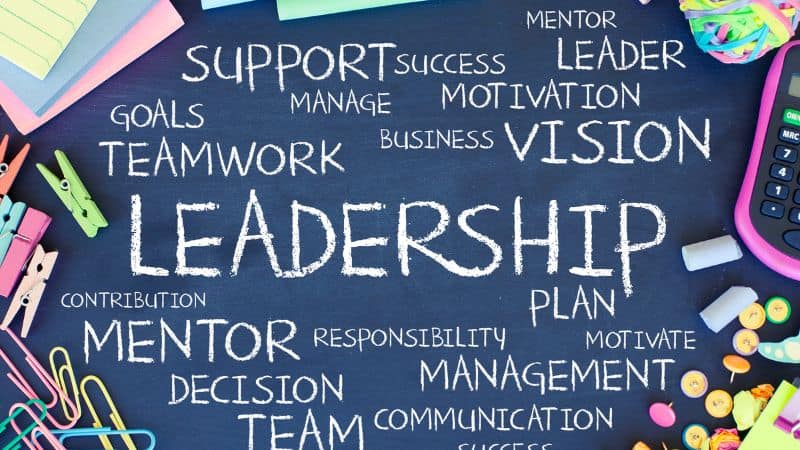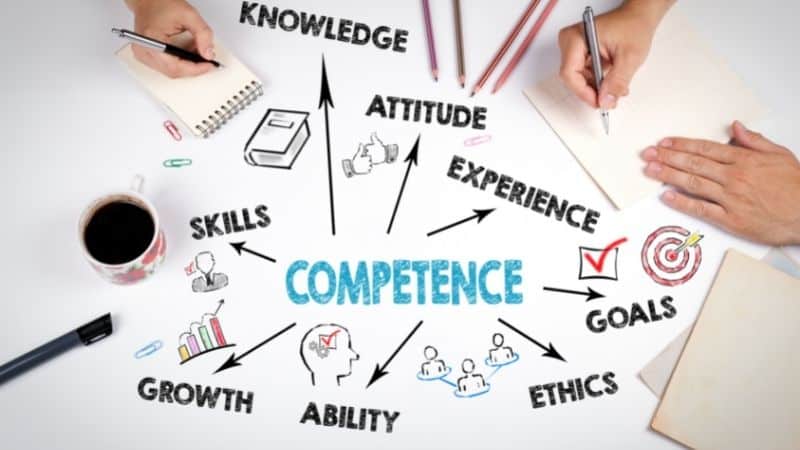Knowing leadership traits that set the greats apart is crucial because it provides a roadmap for personal growth. It helps you understand what truly drives effective leadership, allowing you to model success, inspire others, and make a lasting impact in your organization and beyond.
The characteristics of great leaders attract people to them. For example, leaders with vision, compassion, and humility make us more secure that we will get both results and respect. Some leaders have characteristics or traits they grew up with.
Leadership traits are products of nature and nurture. So first, make the most of your natural talents and traits. Then, develop traits that good leaders need to make the most significant difference in the lives of others.
These leadership traits are the most common characteristics of leaders we want to follow. I included practical steps to develop each. So, if you aim to build good leadership qualities, this article is for you.
To know and develop the best leadership qualities, get practical training. Leaders need to be an example to others. I invite you to bring Leadership Workshops to your company.
What are leadership traits?
Leadership traits are characteristics or personal qualities that leaders possess. People are attracted to leaders who have admirable traits. People follow visionary, responsible, compassionate, and appreciative leaders.
I will share with you the 17 outstanding traits of great leaders. I will explain each and provide valuable steps to develop good leadership qualities.
🚀 Ready to lead at the highest level? Our program builds the skills, strategies, and confidence leaders need to excel. It’s time to stop guessing and start leading with intention.

Traits of Great Leaders
As promised, here are the 17 traits of good leaders. Identify the traits that you already have. You can ask your bosses, co-workers, and direct reports. Get their honest opinions about the qualities you possess as a leader.
You do not need to have all of these traits. First, it is not complete. You likely have leadership traits not listed above.
You are a unique leader. People follow you because of who you are and what you do for them.
What you can do is be the leader you want to be. Explore the simple and easy steps to develop the qualities of good leaders.
Great leadership isn’t an event—it’s a habit. Get actionable leadership habits every Monday and Thursday.
1. Visionary
Visionary refers to the ability of a leader to imagine how a future should be. Good leaders are visionaries. Good leaders see new possibilities.
A nation without a vision will perish. You must have heard of this adage before. And this is true, not just for a country. To prosper, every community must have visionary leaders.
Because the desire to bring about change and create a new and wonderful reality is what leadership is all about. Leadership is more than maintaining stability, peace, and order. Visionary leaders always ask what’s best for everyone.
A vision should be desirable, inclusive, and doable.
Inspiring a shared vision is one of the five practices of exemplary leadership. People agree that leaders who are at their best encourage people to dream big dreams.
Examples of Visionary Leaders
Moses inspired the Jews to leave Egypt so they could settle in the Promised Land. Nobody has been to the Promised Land, not even Moses. They knew that they wouldn’t be second-class citizens or enslaved people anymore.
Martin Luther King Jr did not only deliver his “I Have A Dream” speech. He and others work hard so they will no longer be second-class citizens in the United States of America. His speeches painted the dream of his people.
When Leni Robredo proclaimed that she would continue her Angat Buhay project, I knew she was a visionary leader. This despite losing the 2022 Presidential Elections.
Ways to Develop Visionary Qualities
Ask what’s your greatest dream. Everyone has a purpose, a reason for living. Consider what you’ll do if you have the power to do it.
Ask what people want—working towards achieving what people want to separate a servant leader and a tyrant. A tyrant dreams of a change that serves only himself.
Communicate your vision. Sell your vision to others so that everyone will work on a shared vision. In truth, you won’t be able to do much alone. You need to tell stories that people will be happy to spread.
Articles on Vision
- Inspire A Shared Vision. Paint a vivid picture of the future you desire.
- Selfish vs. Transformative Vision. Not all visions are equal. Some vision statements are self-centered. The best vision statements are transformative.
- Behavior and Vision. It is our day-to-day actions that make our vision real.

2. Responsibility
Responsible leaders are fully aware of the impact of their actions on others. They take ownership of a problem and find solutions. People have confidence in leaders who take responsibility for their results.
With great power comes great responsibility. People remember this because of Spiderman. It was Uncle Ben’s advice to Peter Parker. That line came from Karl Marx, who espoused communism.
The equivalent of responsibility in Tagalog is “pananagutan“. This reminds me of a line in the song Pananagutan.
“Walang sinuman ang nabubuhay para sa sarili lamang.”
Nobody lives for himself alone.
In my dictionary, the word responsibility means the ability to respond – and to own the impact of our response on others.
A responsible leader understands that there is a problem. He takes ownership of that problem. He finds ways to solve the problem and won’t stop until he makes change happen.
You expect every employee in your organization to be responsible. This is why we promote those people who are proactive, problem-solvers, and go-givers to higher positions. We need these qualities of leaders in times of crisis.
Ways to Develop Responsibility
Find your cause. People are facing challenges every day. Some of these challenges you can help solve. However, most of these challenges you can not do anything about. For example, it might concern you that many Ukrainians are victims of a war they did not ask for. Indeed, you can join the voices that call for Russia to stop the invasion.
But, like me, maybe you cannot do much.
There are things that we can solve. For example, many skilled workers in the Philippines can’t find a good job. I can help them find a good job by teaching them how. I can bring people together to achieve the same purpose. You can lead people to solve the problems in your world.
Take risks. The moment you answer to a cause, there are risks that you’ll fail. Some people want to keep the situation the same whenever they want to change something.
For example, not all politicians want people to be poor and ignorant. But a common trait among poor countrymen is their indifference to politics. Many vote for those who can give them something in return for help. For some of us, we call that something a bribe.
As long as many of our fellow citizens are uneducated, we will continue to elect traditional politicians.
If you want to solve this problem, you can expect resistance. Even the best minds among our leaders have found it challenging to go against tendencies.
Embrace failure. It is part of your leadership. To win, you’ve got to jump from one loss to another without losing your enthusiasm. This is one principle that will keep you moving.

3. Integrity
Integrity is the state of being honest and having strong moral principles. Good leaders are honest, and they stand for what is right.
In Filipino, we call this leader “may prinsipyo” meaning a person with principle. Another word is ‘may gulugod“. He has the backbone to express and live out his convictions. We need leaders with integrity because they always keep us on the right path.
Most activists are people of principles. Many people go against them. Those are the people who change their stands as often as the direction of the wind change.
I think of a former presidential spokesperson as an example. He was a human rights activist who became a fascist and reactionary agent.
A leader with integrity is often stubborn. That’s because they work for a cause. Someone who came to mind is Mahatma Gandhi. Discover his life to learn how he lived this leadership quality.
I was told that I was stubborn, too many times. I won’t compromise my morals. For example, I won’t campaign for a known plunderer.
Ways to Demonstrate Integrity
Have a mission greater than yourself. Not only that this person believes in a cause, but the cause also moves him. Ninoy Aquino returned home because ” the Filipino is worth dying for.” What are you willing to die for?
Develop mental toughness. Good leaders are resilient. They stand every time they fall. They try again and again no matter how many times you reject them. They persevere and persist.

4. Persuasion
A persuasive communicator speaks with clarity and conviction. Leaders sell a better future to people. Persuasive leaders have the ability to lead movements.
They speak, and people listen. Find what people need, then deliver it like delicious food. Persuasive communication is one of the best qualities of leaders I admire.
Examples of Persuasive Leaders
Ronald Reagan is known as a great communicator. He speaks the language of ordinary folks when explaining the most difficult political challenges.
If you want to be an effective leader, be a competent communicator. Then, find people who can set themselves as your models.
I have mentioned Ninoy Aquino often because, though I knew him only from a few videos on Youtube, he is a great communicator. He tells stories that make people want to hear more. Watch his video below so you can judge for yourself.
Ways to Become Effective Communicators
Listen first. Listen five times more than you speak. Listen as intently as you can. Value what other people say. Not because they know more than you do. Listen because they can teach you something that does not exist between your ears.
People have stories to tell that you won’t experience unless you’ll listen.
People have fears and aspirations, which you need to know if you want to help them. So listen.
Converse, don’t debate. It is common among those who think they have more than others to argue. It is as if they constantly struggle to prove that the other person is an inferior species. Don’t debate. Converse.
A conversation is a dance. If your partner is moving forward, it is best to move backward. If you keep moving forward, you’ll eventually collide.
Traditionally, the purpose of debate is to find the truth. Unfortunately, these days, some debate so they can hide the truth.
Pay attention to what the other person is not saying. Go beyond hearing and listening. Empathize. Find out what the other person wants. Find out if you can help that person get what he wants — while you are getting what you want.
Communication can be a collaboration. It can be a win-win-win activity.
Articles on Effective Communication
- Deliver Effective Persuasive Speeches. You can learn how to bring people to your good sense. I will teach you how to prepare and deliver persuasive speeches.
- Speak with Confidence. You can learn practical ways to develop confidence. You can speak to a person or a thousand like what you do is the most important thing in the world.
- Give Awesome Impromptu Speeches. One of the best skills I learned is that of speaking without preparation. You can deliver impromptu speeches to any crowd anytime.
- How Public Speaking Turned My Life Around. Public speaking brings joy and meaning to my life. Yet, I had many insecurities about speaking to a crowd. But one day, I discovered its value. And the rest is history.
You can become a persuasive communicator.

Do you know of qualities of good leaders which are not on this list? Share your thoughts. Go to fb.com/jefmenguin to share your thoughts.
5. Positive Appreciation
Appreciative leaders show genuine appreciation for what people can bring. They prefer to focus on the positives. Positive leaders can be social entrepreneurs by looking for ways to multiply what’s available.
Good leaders get ahead of what’s possible. A friend said he is a student of PMA, a positive mental attitude. A positive attitude can help you make possible probable. You become ahead of what’s possible. A leader with this characteristic has a can-do character.
They won’t stop until the change they want to happen.
They see obstacles as stepping stones.
Examples of Appreciative Leaders
This reminds me of Les Brown, who found it difficult to get into school. Educators said that he was not capable of learning.
But his mother persisted and fought for him. Les developed the same trait. In every endeavor in his life, he fought harder, believing that at the very end, he would win.
A positive thinker does not work for vane illusions. He knows that there are failures and setbacks in life. But for every setback, they step up.
Ways to Become More Appreciative
Prefer the positive. There are always negative and positive things in every situation. Learn to appreciate. Instead of complaining about the lack of resources, focus on what you have, no matter how little.
I prefer the positive because no matter the gap between where I am and where I want to go, nothing can stop me from achieving what I want.
Focus on your assets. Assets are those things that can create more value. My one asset is that I have many friends. I can call them when I need help.
I was able to build trust by serving my clients. I got followers from among those who read my articles.
I am capable of speaking before any crowd. I may not have the best vocabulary or the most handsome looks. But I can get people’s attention because I have stories and solutions to share.
Take an inventory of your assets. Make the most of your assets.
Associate with positive people. I tend to be a positive thinker when I work with positive thinkers. I do not mean that you avoid working with small-minded and negative people. You will surely live with them. You will work with them. But if you want to remain optimistic about life, create your Circle of Positive Thinkers.
I made up the name. I don’t have a CPT, but I know who among my friends are positive thinkers. Positive thinkers attract people who want to see positive change happen.
6. Influence
An influencer can change thoughts and behavior, a quality that leaders need to possess when introducing change.
Leadership is influence. In truth, you can influence people to be good and bad. I refer to the quality of leaders who have a positive influence. They inspire, enable, and help people achieve.
Influencing is about helping others behave differently to get positive results. For example, I encouraged students to embrace a growth mindset as a teacher. Using classroom activities, I help them realize we can create limitless possibilities.
Influence is not manipulation. Dictators do manipulate people. In the olden days, they used propaganda machines. These days, they use troll armies. Dictators deceive. Leaders enlighten us so we see more extraordinary things.
Ways to Build Influence
How can you increase your influence? I have a training program for that. (Yes, I am selling here!). However, you can start with three steps.
Discover the motivations of your people. From the outside, it would seem to many that a leader is a great motivator. Perhaps. But influencing is beyond getting people motivated.
They know what motivates people. How? By asking and observing people. They wear their shoes and try to see things from their perspectives. They understand what motivates the people. Then they try their best to help them.
Enable people. Find out what people are capable of doing. Reinforce their capability through coaching and mentoring. Understand what people are not capable of doing. Help them develop the skills.
I mentioned that influencing is more than motivating people. As a leader, you will explore motivation, ability, and opportunity.
Study how to persuade and motivate people. An excellent communicator knows how to influence people.
Articles on Persuasion
Get these two articles. Print them. And as a thank you for having them today, please share them on your favorite social media platform.

7. Discipline
Disciplined leaders command respect from others because they consistently do what must be done daily. They lead by example and do not exempt themselves from hard work. They have the confidence of others because they do what’s right every time.
A good leader is a disciplined person. You can find a good dictionary definition of the word discipline. I want you to remember that it has the same root word as a disciple, a follower.
A disciplined leader follows his values, beliefs, or principles. He follows a system or a process. It does not mean that he follows everything that his leaders say. There are other names for people who follow everything someone says: minion, slave, and fool. You are neither.
I do believe that a good leader is a good follower. Therefore, being a disciplined leader is a characteristic you can consider developing.
Ways to Develop Discipline
Be action-oriented. Keep on moving until you create your momentum. If you need to throw a ball a thousand times to master throwing ball, you will do that. And you will do that with discipline. You will study the principles that make a perfect throw and make adjustments.
Similarly, if you want to lead people, then lead. Get into an organization or create one. Study the qualities of good leaders, explore the behaviors that make them succeed, and identify the mindsets they embrace. Study, try, and apply. Rinse and repeat.
Pay the price of success. If you want to achieve something, you should give it your best. If it is of utmost importance to you, give it your 10,000 hours. I mean, pay for what it’s worth.
Often, we wonder why some leaders keep on grinding. That’s because they are disciplined. They pay for what they want with blood, sweat, and tears.
Stop making excuses. If you make excuses, you will find all the reasons to stop doing it. Or, at the very least, you will procrastinate.
You will call yourself an imposter.
Good leaders do not entertain excuses. Excuses are justifications for not doing anything.
The opposite of excuses is execution.
Do not blame others. Do not point fingers at those who failed. Instead, take ownership, find solutions, and work until you finish things.
It is that simple.

8. Trust Building
Trust-building leaders demonstrate competence, confidence, and care for others. They are fair and just. They bring people together.
Trust is the glue that binds people. Through their words and actions, leaders say, “We are alike .”I see common characteristics among trusted leaders.
They show people they care, and they walk the talk. They are believable and credible. And they are consistent; inconsistent people aren’t easy to trust.
But good leaders aren’t just trustworthy. They build trust because they know people work well in a trusting climate.
See the contrast between good leaders and tyrants? Good leaders are transparent. Tyrants are deceptive. Tyrants kindle mistrust among their lieutenants so that no one can replace them. And on the other hand, good leaders build trust so anyone can step up.
Is that clear enough?
Ways to Build Trust
Be vulnerable. Brene Browne talks a lot about vulnerability. It is not necessarily allowing people to see you naked. It means you are not using a shield and spear when dealing with people. Instead, you allow them to know you and even see your weaknesses.
In the book The Five Dysfunctions of a Team, I learned that many teams fail because they don’t allow themselves to be vulnerable.
Trust first. Often, leaders demand people trust them because they are leaders. But we know that this does not work.
People will trust you when you show that you are trustworthy. You do that by showing first that you trust your people. That means you allow them to speak their mind, contribute, and initiate.
Converse. Earlier, I encouraged you to converse, not debate. People need to know that you allow them to move with you. Good leaders converse before they command. Converse before you command others is also a tool for change-makers.
You can share the qualities of good leaders on Linkedin too. People will find these ideas very valuable. You can connect with me via https://www.linkedin.com/in/jefmenguin/

9. Change-making
A rare quality, but something we expect from leaders is of a changemaker. Good leaders imagine new ways of doing things. They always look for what is good and better for others.
A leader must challenge the status quo and make change happen.
Have you observed that most of these qualities of good leadership are connected? For example, when discussing responsible and principled leadership, please note that I highlighted their sense of purpose.
Leaders want to make change happen. And that change makes the visionary leader work every day.
Leaders transform realities. They create a tomorrow much better than today.
But how do you make change happen?
Ask what can be improved. Often, we need only to make things much better than before.
For example, a mayor may look for ways to ensure every household will have a college graduate. Of course, it may not be possible for everyone to become professional, but at least government officials may make such a goal.
Ask what you can start doing. Change happens when one creates something. It doesn’t have to be significant. Say you are a campus leader and want to raise the quality of Philippine education.
That is an enormous task. And as a student, you are not likely to create a significant change. But there are things you can do. Start a study circle, perhaps. Or connect with other student organizations in your city for a common cause.
Ask what you can replace. Replace what does not work with what works. Replace mediocre with good and good with great. Indeed, there are things worth changing.
Find something that you can immediately change. It is good to have small wins.

10. Focus
Focus is a quality of a leader who pays attention to what’s most important. Focused leaders do not stress themselves about many things. They are always on a mission to accomplish the one thing they mean to do.
Good leaders know their priorities. They set their standards and weigh things according to those standards. When you know your criteria, you can navigate through the chaos. You will not worry whether you have done enough. Doing first things first is enough.
Leaders know how to prioritize. And you must know how to set priorities too. So here are some simple steps.
Set your standard. Define what’s important to you. Sometimes I felt I had to work long hours to provide for my Family. Many of us are doing that too. But we must not confuse ourselves between Work and Family.
Once I say Family First, I must be very clear about that. That means I should allow myself to delay work, leave work, and not work for my Family. If I can’t get rid of work because I want to earn more money, it becomes Work First.
For this reason, I resolve to find work that will allow me to leave it for my Family. I choose work that makes me earn 10x or 100x, or 1000x more than legislated wages. If I only needed to work ten days a month, I could free up much time for my Family.
Did you get that?
Of course, every leader has to set a standard. Others have politics first, church first, or work first. Know what’s your first, and all that follows will be revealed to you.
Do you first thing each day? Put your first things in the schedule. It does not have to be the first and only thing you’ve got to do daily. But you should put it on your calendar to avoid missing it.
You can do many things in the morning that will prepare you. You can pray or do a meditational walk. You can jog or bike around the community. You can cut grass or plant vegetables (I do this, too!). You can do bullet journals or freewriting. These are not my first things but they are part of my daily warm-ups.
Your first things are those that matter to you most. By doing them, you can say that you’ve done enough. After that, everything else is a bonus.

11. Future-Ready
One characteristic of a good leader is the ability to prepare people for the future. Being forward-looking helps leaders anticipate adverse situations.
Good leaders always ask, What’s next? They manage the present, but they always prepare for the future. They ready themselves and the people they lead.
Why is that important?
A visionary leader dreams of a future that is better than today. If we are the creators of our realities, then it follows that most of us are not ready for that better future. To create the future, we must ready ourselves today for that future. Else, we’ll be like a mouse running on a wheel.
Here’s how to be future-ready.
Set your roadmap. You may call it a strategic plan or simply a road map. The road map isn’t the real thing. It is constantly changing.
But the good thing about having a roadmap is that you do not need to imagine what you need to do next. Instead, you will only ask, what’s next?
Manage the Present. Good leaders don’t just think of pie-in-the-sky because they keep their feet on the ground. They improve systems and processes. They deliver what they need to do in the morning. Then, in the afternoon, they prepare their people for the future.
Prepare for the future. Train yourself, develop leaders, and train employees. Explore various ways of helping your people learn what they ought to know. It is easier these days. Find ways to upgrade skills and mindsets.

12. Leader Building
Good leaders, unlike tyrants, aren’t afraid to be replaced. They constantly develop leaders and their successors. They grow leaders because the vision or the cause is more important than the leader.
Moses did not reach the Promised Land. He learned how to communicate, delegate, and manage his time. More importantly, he was able to prepare his leaders through delegation.
When a cause is more important than your personal dreams, you won’t be afraid to be replaced by someone who can lead better. This is how good leaders become great leaders.
I have given you clues on how to develop this quality.
Look for a successor. When you employ someone, look for a successor who can replace you or the leaders in your organization. Keep in mind that people won’t be here forever.
New leaders come, and old leaders go, sometimes unexpectedly.
Look for people who model the values you aspire to. Find people who are already competent so you won’t have to spend much time training them in the basics. And if you want someone who’s not yet capable, get someone whose values you admire.
Delegate work. The best thing about delegation is sharing your responsibility while allowing this person to develop experience under your guidance. To delegate is to enable people. You can develop effective leaders by combining delegation, training, and self-learning.
Learn to motivate. Go to my article about motivating people. You’ll learn one thing or two to get you started. Remember that though you cannot motivate people, you can create a climate that will keep them motivated.
- 21 Benefits of Leadership Training. Enable others to act. Help your employees become better. Here are the benefits of training people.
- Deliver motivational speeches. You can encourage people to become better leaders. Here are simple steps to deliver motivational speeches.
- Motivational Speaking. If you need a motivational speaker, I can help you.
13, Leading By Example
One attractive quality of leaders is their ability to lead by example. This means that they are showing how people must behave today and in the future. Leaders who lead by example are the best teachers.
Good leaders model the way. They show people what they expect them to do. That means they lived their lives according to their ideals. As a result, their actions are aligned with their values.
People trust leaders who walk the talk. They know that they live up to their commitments.
To practice this leadership quality, I recommend the following.
Find your voice. Understand what you are passionate about. One way to do this is to think of those times you felt alive, most useful, and most happy about your actions. You will find it is easier to work when you follow your calling.
Set an example for others. Good leaders understand that people are watching them. So their actions send a signal about what’s most important to them. For example, a person who values excellence will show excellence in his undertakings.
Among the qualities of good leaders, I found this to be often ignored. Leaders forget that they model all the time.
I am expounding on this leadership quality in the following articles:
- To Lead by Example. You can lead by example through words and deeds. You’ve got to get your hands dirty and be mindful of your words.
- Model the Way. You need to clarify your values and set yourself as an example to others. Then, please encourage others to define their values too and be examples to others.
- Why Make A Difference. You can inspire others to change the world.
14. Innovation
The innovator seeks opportunities to add value to services, products, and people. A leader who makes creativity serves a great purpose is an innovator.
Good leaders ask, what’s next, what can be done better, and what can be changed. They look for opportunities for transformative change.
To innovate is to add value. You are not inventing new things; instead, you see old things differently.
Seek opportunities to improve a process. If it takes 21 steps to work on something, can it be done in 15 steps without sacrificing quality? Can it be done in 10? Always look for ways to improve the value of your products and services.
Be open to limitless possibilities. Welcome the opinion of people around you. Even if you believe that you are the most intelligent person in the room, consider that some people know more than what we do.
15. Resilience
Resilient leaders sustain their energy and enthusiasm under pressure. They embrace challenges and they can cope with disruptive challenges.
Filipinos are resilient people. No typhoons, earthquakes, or volcanic eruptions can make Filipinos quit. We’ve survived Covid-19. We’ve endured bad governance. We failed so many times. But we also bounce back.
For this reason, we deem resiliency one of the most important qualities of good leaders during Covid-19.
But let me explore resiliency beyond the simple metaphor of bouncing back. Because bouncing back isn’t always a good thing. A mouse in a wheel also endures.
We need a resilient leader who manages a present crisis while preparing us for the next normal. We need to learn from our experiences, so we don’t have to keep repeating the same mistakes.
This reminds me of Noynoy Aquino, who thought it was not wise to keep rescuing people from floods. Flooding is predictable in this country. More than twenty typhoons visit us every year.
So instead of buying thousands of rescue boats, he convinced those living along the Pasig River to relocate.
Then, he launched Project Noah, which saved thousands of lives. But unfortunately, Presidente Duterte stopped funding it and has not replaced it with something better.
A resilient leader takes care of his people today and prepares them for the future.

16. Confidence
Confident leaders have a healthy appreciation of their abilities and strengths. This quality allows them to try new things. People follow leaders who are confident.
We trust leaders based on competence and confidence. Unfortunately, you can find many competent managers who fail to lead because they lack confidence.
On the other hand, some confident managers lack competence. Because of this, we say that they are over-confident.
Overconfidence is often equated to arrogance.
To gain confidence, you need to get more wins. One success after another gives you confidence.

17. Humility
Leaders who demonstrate this leadership quality do not make themselves the life and center of any organization. When success comes, humble leaders honor their people. When they fail, they take accountability.
Being humble is easier than being arrogant. The difference is not competence or confidence. The difference is who gets the spotlight.
An arrogant person thinks too highly of himself. He talks to praise himself and convince people he deserves every praise. And at times, this person deserves all the credit. Unfortunately, he cannot wait for others to give it to him.
A humble person does the opposite. When projects are successful, he praises everyone who made the project work. Then, he looks around and says, “All of this happened because of you.”
And when a project fails, he is the first to say, “Mea culpa.” And he does this with sincerity.
You can be humble too. Give honor to everyone who made things happen.
These 17 qualities of good leaders are by no means complete. Leaders demonstrate different combinations of leadership characteristics.
I encourage you to ask your employees about the qualities of leaders they want to see in your organization.
Real-World Leaders and Their Qualities
Another way to understand leadership qualities is to consider real-world leaders. The following are some of the leaders whom I personal admire.
Leni Robredo – Empathy and Grassroots Advocacy: As the Vice President of the Philippines, Leni Robredo has been recognized for her empathy and commitment to grassroots advocacy. She has focused on addressing social issues such as poverty, education, and healthcare, particularly for marginalized communities. In addition, her leadership style prioritizes collaboration and inclusivity, which has earned her the respect and admiration of many Filipinos.
Nelson Mandela – Resilience and Forgiveness: Mandela was imprisoned for 27 years due to his anti-apartheid activism. Upon his release, he became South Africa’s first black president and focused on reconciliation and unity, forgiving those who had oppressed him and his people.
Mahatma Gandhi – Nonviolence and Humility: Gandhi led India to independence from British rule through nonviolent civil disobedience. His humble lifestyle and commitment to equality inspired millions around the world.
Martin Luther King Jr. – Courage and Vision: King was a key figure in the American civil rights movement, advocating for racial equality through nonviolent protest. His powerful speeches and unwavering courage inspired many to join the fight for civil rights.
Eleanor Roosevelt – Empathy and Advocacy: As the First Lady of the United States, Roosevelt championed human rights and social justice issues. She used her platform to raise awareness and support for marginalized groups, and her empathy and advocacy endeared her to many.
Steve Jobs – Innovation and Vision: The co-founder of Apple Inc., Jobs was known for his relentless focus on innovation and design. His visionary leadership transformed the technology industry and made Apple one of the most successful companies in the world.
Malala Yousafzai – Bravery and Activism: A young Pakistani activist, Yousafzai was shot by the Taliban for advocating girls’ education. She survived the attack and continued to speak out, eventually becoming the youngest Nobel Prize laureate.
Jacinda Ardern – Compassion and Crisis Management: As New Zealand’s Prime Minister, Ardern has been praised for her compassionate and effective leadership during crises, including the Christchurch mosque shootings and the COVID-19 pandemic. Her emphasis on empathy and unity has resonated with many people.
Angela Merkel – Pragmatism and Steadfastness: As Germany’s Chancellor, Merkel was known for her pragmatic approach to governance and her ability to navigate complex political landscapes. Her steady leadership during various crises, including the Eurozone debt and refugee crises, earned her worldwide respect.
I encourage you to learn more about these leaders.
Leadership Articles
I hope you’ve seen the benefits of developing the qualities of good leaders. Good leaders are known for something. You can decide what you want to be known.
- Develop Leadership Qualities. If you want to know how to develop the qualities of good leaders, you can do it in easy and simple steps. Find out how.
- What Leadership Is. If you want to accelerate your leadership learning, I encourage you to begin by understanding what leadership is all about.
- The Relentless Leadership of Leni Robredo. The former Vice President of the Philippines has shown demonstrated her ability to solve problems. During the times of Covid-19, she helped Filipinos survive. She did things that no government official has done.
- Bayanihan. I believe that one of the characteristics of Filipino leaders is their capacity to become heroes. They sacrifice. They work together for the benefit of others.
- 5 Principles to Guide Adaptive Leadership. HBR provided five principles that will guide leaders in times of a crisis like Covid-19.
- 3 Skills Needed for Adaptive Leadership. These three skills are resilience, influence, and leading change.
- What are the Qualities of Visionary Leaders? They see the world differently, help others see it, and make things happen. This article is informative.
- The Language of Accountability. Good leaders hold themselves accountable. They must walk the talk and fulfill their promises.
- 25 Ways to Build a Successful Team. One of the qualities of good leaders is that they build successful teams. They know that they cannot make a change on their own; they need to rally the support of the people.
- Leadership Principles. Leaders have integrity. They lead according to their principles. Find out how you too can define your leadership principles.
- Leadership Styles. People consider your qualities based on your leadership style too.
- Model the Way. Leaders walk the talk. Find out how you can promote this in your organization.
FAQs
Qualities of Leaders We Admire
Leaders are valuable assets of any organization. Unfortunately, good leaders are very few.
What are the qualities of leaders you admire the most?
List down the leaders who made the biggest influence on your life. Consider the qualities that attracted you to them.
You will discover that you have the characteristics and traits they have too. If you have not seen it before, that’s because you were looking at them.
The qualities of leaders I presented in this article are the qualities I have seen in the leaders I admire. And I discovered that I have some of them too.
But why do we need to develop these qualities of good leaders?
We want a better world.
We lack good leaders in our government. Most of them turn their offices into family businesses.
Our problems remain because they profit from our problems. They get richer while the citizens get poorer. They appoint their supporters to public offices based on utang na loob, not merits.
We want a better world. Our leaders promised to bring us to that world to get elected. But they preserve the status quo because they are afraid of real change.
Only good leaders desire a better world for all. But we cannot wait for good leaders to appear.
Real change can happen when you and I become good leaders. This is why we need to develop the qualities of leaders we admire. We must become good leaders.

Good Leaders at Work
Develop the qualities of good leaders at work.
Many supervisors get promoted though they lack competence and confidence.
There are no qualified candidates and someone has to take the job. High potential employees who are not ready for the job do not perform at their best. They get easily frustrated, even doubting themselves.
Identify the qualities of good leaders you need in your company. Then build their skills.
If you are a supervisor, you have access to ideas, techniques, and tools. And for those who have the resources to upgrade their skills, I designed webinars and online classes to teach them proven and effective ways to become better supervisors.
Those who fear public speaking will find excellent ideas on how to speak with confidence and influence people.
I know many managers and supervisors who can invent thousands of excuses when asked to speak in front of a crowd. Leadership is influence, and your ability to persuade people increases your chances of motivating employees and turning your customers into raving fans.
The pandemic tested the limits of many leaders. Globally, we have seen how arrogant but incompetent leaders failed to protect people from Covid-19.
We have seen how unfit our political leaders are in handling the crisis. Instead, they resorted to blaming people and propaganda. They failed to communicate any solid plan. They demonstrated poor ability to receive feedback. And this will continue until we learn.
You have finished reading the 17 Qualities of Good Leaders. I hope you have learned something that will benefit the people around you.






